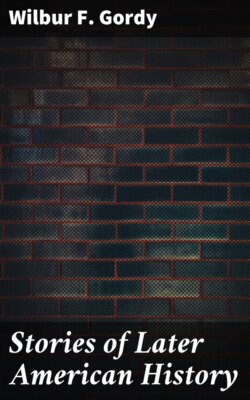Читать книгу Stories of Later American History - Wilbur F. Gordy - Страница 18
На сайте Литреса книга снята с продажи.
THE WAR BEGINS NEAR BOSTON
ОглавлениеTable of Contents
Return to Table of Contents
When Parliament passed the Boston Port Bill, the King believed that such severe punishment would not only put a stop to further rebellious acts, but would cause the colonists to feel sorry for what they had done and incline them once more to obey him. Imagine his surprise and indignation at what followed!
John Hancock.
As soon as General Gage ordered that the Massachusetts Assembly should hold no more meetings, the colonists made up their minds they would not be put down in this manner. They said: “The King has broken up the assembly. Very well. We will form a new governing body and give it a new name, the Provincial Congress.”
And what do you suppose the chief business of this Congress was? To make ready for war! An army was called for, and provision made that a certain number of the men enlisted should be prepared to leave their homes at a minute’s notice. These men were called “minute-men.”
Even while the patriots, for so the rebellious subjects of King George called themselves, were making these preparations, General Gage, who was in command of the British troops in Boston, had received orders from England to seize as traitors Samuel Adams and John Hancock, who were the most active leaders.
John Hancock’s Home, Boston.
Of Samuel Adams you already know. John Hancock was president of the newly made Provincial Congress.
General Gage knew that Adams and Hancock were staying for a while with a friend in Lexington. He had learned also through spies that minutemen had collected some cannon and military stores in Concord, twenty miles from Boston, and only eight miles beyond Lexington.
The British general planned, therefore, to send a body of troops to arrest the two leaders at Lexington, and then to push on and capture or destroy the stores at Concord.
A Minuteman.
Although he acted with the greatest secrecy, he was unable to keep his plans from the watchful minutemen. We shall see how one of these, Paul Revere, outwitted him. Perhaps you have read Longfellow’s poem which tells the story of the famous “midnight ride” taken by this fearless young man.
Paul Revere had taken an active part in the “Boston Tea Party,” and the following year, with about thirty other young patriots, he had formed a society to spy out the British plans. I fancy that the daring and courage called for in this business appealed to the high spirits and love of adventure of these young men. Always on the watch, they were quick to notice any strange movement and report to such leaders as Samuel Adams, John Hancock, and Doctor Joseph Warren.
On the evening of April 18, 1775, Paul Revere and his friends brought word to Doctor Warren that they believed General Gage was about to carry out his plan, already reported to the patriots, of capturing Adams and Hancock, and of taking or destroying the military stores at Concord.
Doctor Warren quickly decided that Paul Revere and William Dawes should go on horseback to Lexington and Concord and give the alarm. He sent them by different routes, hoping that one at least might escape the British patrols with whom Gage had carefully guarded all the roads leading from Boston.
Old North Church.
Soon Dawes was galloping across Boston Neck, and Paul Revere was getting ready for a long night ride.
After arranging with a friend for a lantern signal to be hung in the belfry of the Old North Church to show by which route the British forces were advancing, “one if by land and two if by sea,” he stepped into a light skiff with two friends who rowed him from Boston across the Charles River to Charlestown.
Upon reaching the other side of the river, he obtained a fleet horse and stood ready, bridle in hand, straining his eyes in the darkness to catch sight of the signal-lights. The horse waits obedient to his master’s touch, and the master stands eagerly watching the spot where the signal is to appear.
Paul Revere’s Ride.
At eleven o’clock a light flashes forth. Exciting moment! Then another light! “Two if by sea!” The British troops are crossing the Charles River to march through Cambridge!
No time to lose! Springing into his saddle and spurring his horse, he speeds like the wind toward Lexington.
Suddenly two British officers are about to capture him. He turns quickly and, dashing into a side-path, with spurs in horse he is soon far from his pursuers.
Then, in his swift flight along the road he pauses at every house to shout: “Up and arm! Up and arm! The regulars are out! The regulars are out!”
Families are roused. Lights gleam from the windows. Doors open and close. Minutemen are mustering.
When Lexington is reached, it is just midnight. Eight minutemen are guarding the house where Adams and Hancock are sleeping. “Make less noise! Don’t disturb the people inside,” they warn the lusty rider. “Noise!” cries Paul Revere. “You’ll have noise enough before long. The regulars are out!”
Soon William Dawes arrived and joined Revere. Hastily refreshing themselves with a light meal, they rode off together toward Concord, in company with Samuel Prescott, a prominent Son of Liberty whose home was in that town. About half-way there, they were surprised by mounted British officers, who called: “Halt.”
Prescott managed to escape by making his horse leap a stone wall, and rode in hot haste to Concord, which he reached in safety; but Paul Revere and William Dawes both fell into the hands of the British.
